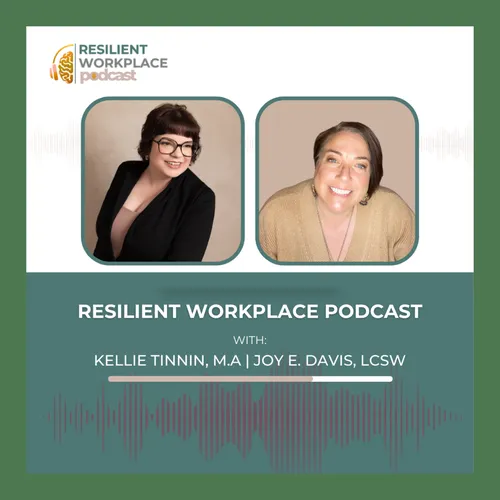Episode 6 Neuro Nuggets: Unlocking the Power of the Three Neuros
- Author
- Joy Davis & Kellie Tinnin
- Published
- Wed 02 Apr 2025
- Episode Link
- https://infox9h.podbean.com/e/neuronuggets/
The Resilient Workplace Podcast
Episode #6: The Three Neuros
Date: April 2, 2025
Episode Summary:
In today’s episode, we’re diving into the world of neuroscience and its profound impact on workplace culture and mental health. We’ll be exploring three key concepts—Neurodivergence, Neuroplasticity, and Neuropsychology—and discussing how they show up in the workplace. Stay tuned for actionable mental health takeaways and coping strategies that can help you and your team thrive.
Discussion Points:
1. Neurodivergence in the Workplace
Definition: Neurodivergence describes variations in cognitive functioning, such as ADHD, autism, dyslexia, and more.
How It Shows Up in the Workplace:
Employees may excel in creative thinking, problem-solving, or hyperfocus but may struggle with traditional structures.
Lack of understanding or accommodations can create barriers for neurodivergent individuals.
According to SHRM, approximately 14% of adults possess some type of neuro differentiation.
Challenges:
Misaligned expectations or stigmatization can lead to disengagement or mental health challenges.
Practical Takeaways:
Implement inclusive hiring practices (e.g., structured interviews, skills-based assessments).
Provide accommodations like flexible schedules, assistive technology, or sensory-friendly spaces.
Educate teams about neurodiversity to reduce stigma and foster an inclusive environment.
2. Neuroplasticity in the Workplace
Definition: Neuroplasticity refers to the brain's ability to adapt and rewire itself based on experiences and learning.
How It Shows Up in the Workplace:
Employees can develop new skills and behaviors with proper training and practice.
Leaders can reshape workplace dynamics by fostering growth mindsets and adaptability.
Training programs should incorporate multiple modalities to support behavior change over time.
Key Insight: Burnout can hinder neuroplasticity, while fostering a positive environment enhances it.
Practical Takeaways:
Encourage continuous learning through professional development programs.
Use feedback loops to reinforce learning and behavior change.
Promote resilience training to help employees reframe challenges into growth opportunities.
Reward effort and progress, not just outcomes.
3. Neuropsychology in the Workplace
Definition: Neuropsychology focuses on how brain function impacts behavior, decision-making, and mental health.
How It Shows Up in the Workplace:
Stress, fatigue, and mental health issues directly impact productivity and decision-making.
Leaders who understand neuropsychology can foster environments that support mental resilience.
Key Insight: Chronic stress impairs cognitive performance, while supportive environments enhance problem-solving and collaboration.
Practical Takeaways:
Educate leaders about the impact of stress on decision-making and emotional regulation.
Promote regular breaks, healthy boundaries, and mental health days.
Offer personalized support and structured routines for neurodivergent employees.
Provide clear, strengths-based feedback to enhance engagement and retention.
Episode Recap & Takeaways:
Understanding neurodivergence can help create more inclusive workplaces.
Leveraging neuroplasticity enables continuous learning and adaptability.
Applying neuropsychology principles supports mental resilience and productivity.
Organizations should focus on structured support, education, and feedback-driven approaches to enhance employee well-being.
In the next episode we will be discussing The Tech Tornado
Navigating the whirlwind of changing workplace technology and its impact on employees and organizations.
Follow Us:
- Facebook: [@ResilientWorkplaceInnovations]
LinkedIn: [/resilient-workplace-innovations]
Thank you for listening to The Resilient Workplace Podcast! Don’t forget to leave a review and subscribe for more.
Resources:
